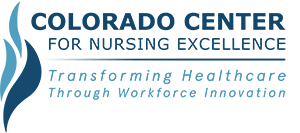(Download Quick Facts on Nursing Supply and Demand for Nursing Education)
- Even though health care hiring of new nurse graduates has slowed over the past 12 months, Colorado’s schools of nursing should not decrease their enrollments. Projected increases in demand for nurses due to health care reforms, baby boomer nurse retirements, and Colorado’s growing older population will cause an increased need for nurses across the state.
- We expect the increased demand for nurses to be realized within the next 5 years. Therefore, full enrollment of nursing students in programs, that take about 4 years for completion, is essential to meeting the health care needs of Colorado’s citizens.
- Preparing future nurses and health care workers must be a priority for Colorado’s educational system. The health care and social service sector provides employment to 11 % of Colorado employees (1 in 9). It is second only to retail in its total job volume, with 253,000 employees, and generates an annual payroll of over $11 billion.
- Even without factoring in any impact of health care reform, the Colorado Department of Labor and Employment projects a need for 18,990 additional registered nurses from 2008 to 2018. These nurses will be needed to replace retiring nurses (6,750) well as to respond to increased health care demand due to population growth (12,240).
- Based on the fact that 32% (20,000) of the state’s licensed RNs are currently over 55, we believe that the requirement for new nurses to replace retiring nurses will be even larger than government estimates would suggest. In 1993, only 9 percent of Colorado’s health care workforce was over the age of 55; today it is 20 percent.
- Colorado will face a rapidly increasing demand for health care during the coming decade because the state’s population will expand by one million and there will be 389,000 more adults over 65.
- On top of increased demand for nurses and health care providers due to population growth and demographic changes, retirement is also an issue. Historically, nurses start retiring at age 58. The age profile of Colorado’s 61,000 licensed registered nurses is: 4,500 are over the age of 65; 6,600 are 60-65; and 10,100 are 55-59.
- Colorado needs 1,780 more nurses now to reach the national average nurse to population ratio.
- Conservative assumptions indicate that Colorado will be short 6,300 registered nurses by 2018; less conservative retirement assumptions plus the impact of health reform could easily double this shortage. The unknown factor is how many nurses the state will be able to import from outside Colorado, given the reality of a nationwide nursing shortage.
- As the uninsured gain increased access to care, we expect to see an increase in the demand for registered nurses in physician offices, community care clinics, public health and other service areas.
- A significant increase in opportunities for advanced practice nurses, especially nurse practitioners, is emerging to help meet the consumer’s primary care needs. The pipeline for preparing advanced practice nurses must be enlarged to meet the future demands of Coloradans.
- Although the pipeline for nursing education has significantly expanded since 2000, very serious challenges remain in developing, recruiting and paying for school of nursing faculty and meeting the annual demand for over 2 million hours of student nurse clinical experiences.
- Based on a recent Colorado Health Institute survey, 42 percent of the state’s school of nursing faculty are over 55 years old. 23 percent of current faculty indicate they will retire within 5 years; 48 percent indicate they will retire within ten years.
- Colorado’s need for nurses to support health care services will continue to outstrip the supply of nurses unless concerted action is taken by public, private and educational institutions.
